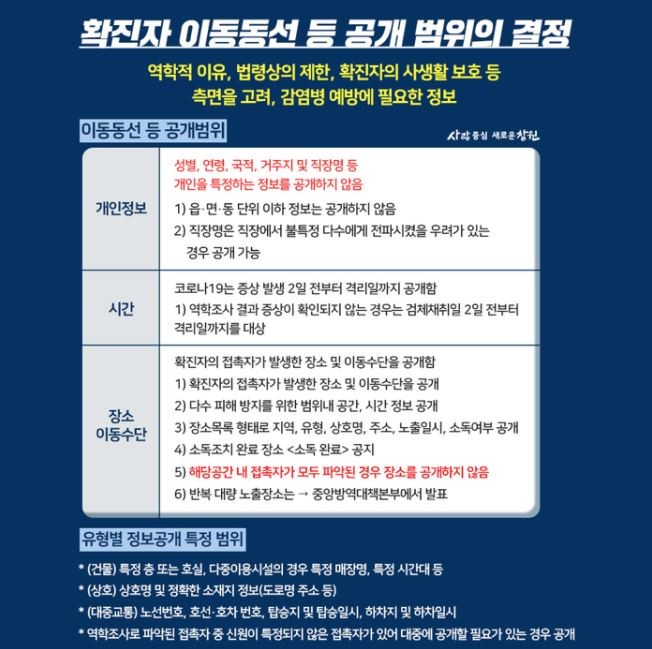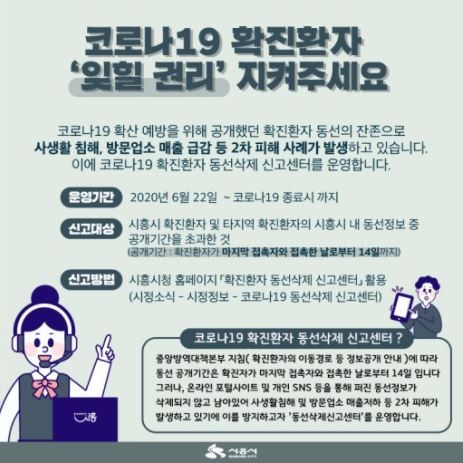Have you ever thought that revealing the route of a confirmed COVID-19 patient was an invasion of privacy?’ Many people in Korea and around the world have been raising the alarm on this issue. In Japan, the standards for reporting the route of confirmed patients varies from region to region. For example, nationality, residence, occupation and the mount of detail revealed about the patient’s activities are different for each prefecture. In the USA, governments are using surveillance tools that push privacy limits, generating a lot of criticism from the public. However, I disagree with those that believe the public sharing of this information is an invasion of privacy since it is an essential tool in the preventing the spread of the virus. There are three reasons for my opinion. First, limited public information can amplify the anxiety of citizens. Next, it is better for citizens to rely on confirmed information, rather than rumor or hearsay and finally open access to this sort of information does not cause backlash against patients, poor online etiquette does.
First, limited information can amplify society’s anxiety about COVID-19. Many SNS pages, especially Facebook, enable governments to share patient travel information quickly. Thanks to the fast and accurate information delivery of local governments, users have swift and concise access to necessary information quelling any anxieties. Without the information provided, it would be hard for people to check whether a confirmed patient’s route overlaps with their own. In fact, blog posts and café discussions highlighted the fear that without more information it would be hard to go outdoors. Lowering the level of information provided to the public is disadvantageous as accurate information is an important factor for self-quarantining for the purpose of preventing the further spread of the virus.
 |
| ▲ Standard for disclosing the route of COVID-19 patients. (Photo from Naver Blog) |
Second, it would be difficult to bridge the information gap regarding COVID-19. Most elderly people normally get their information from disaster alert texts and the city hall’s website and sometimes cannot check their facts. For instance, rumor and hearsay are often posted next to generalized patient route information. Netizens post comments such as “When I was in Starbucks, the health center disinfected the space. So, café 00 must be this Starbucks.” Most SNS users can fact check this information, but not everyone can. There is also a chance that the information posted is biased or distorted due to nature of SNS where information is constantly produced and exchanged amongst users. Many people can be triggered by false information and this can impact the livelihood of small business owners. For example, if users were to say a confirmed patient went to a certain café, this may lead to others avoiding the site in future and if the information was a lie, the café owner would suffer needless losses.
Finally, many people say that confirmed patients are criticized when they make their route public. However, they are not responsible for the malicious comments and criticisms afforded against them. Some people argue that overly detailed disclosure of route cause baseless conjecture and slander. Some people think “The patient should be condemned for going out so much” and others think, “We are helpless in stopping the spread of this virus.” However, I believe this is not a problem route disclosure, but a problem of our SNS comments culture. Sharing details is necessary to provide accurate information to prevent further infections. It is a low level of civic consciousness that blames patients for the inevitable disclosure of information. This is a matter of good netiquette behavior and the basis for releasing the information is the ‘Law for the Prevention of Communicable Diseases.’ After the failure of the MERS, the government increased the intensity of information disclosed. Under the new law, ‘the government can gather information without the agreement of the public as a means for collecting accurate information is more important than protecting privacy.’ To combat the problem of poor netiquette, the government should strengthen punishment and regulate malicious comments levied against confirmed patients, instead of lowering the intensity of disclosure to protect privacy. Protecting the public from the corona virus should be prioritized over protecting an individual’s right to privacy.
 |
| ▲ Rights to be forgotten about the route of COVID-19 patients. (Photo from Naver Blog) |
To conclude, while controversies still exist regarding the level of public disclosure necessary for the interest of public safety I believe the release of accurate information is imperative for bringing a quick end to the COVID-19 crisis. Based on the existing Law for the Prevention of Communicable Diseases, governments can collect and release information on patient routes without their explicit consent. We should keep in mind that criticism of a patient’s whereabouts is not a matter of disclosure itself, but a matter of people who do not adhere to the basic rules of good netiquette. The government and public health center should try to filter out malicious comments and punish those responsible for defamation. I think privacy is an important human right, but not an absolute right. There must be a balance between protecting privacy and protecting the public from the potential danger of infection. Controlling the spread of the corona virus through route disclosure is a target of criticism, but the criticism is not valid when the safety of a society as a whole is at stake.
정소연 dankookherald@gmail.com

![[Campus Magnifier] Let's Surf the Library!](/news/photo/202404/12496_1765_4143.jpg) [Campus Magnifier] Let's Surf the Library!
[Campus Magnifier] Let's Surf the Library!
![[Campus Magnifier] Let's Surf the Library!](/news/thumbnail/202404/12496_1765_4143_v150.jpg)





